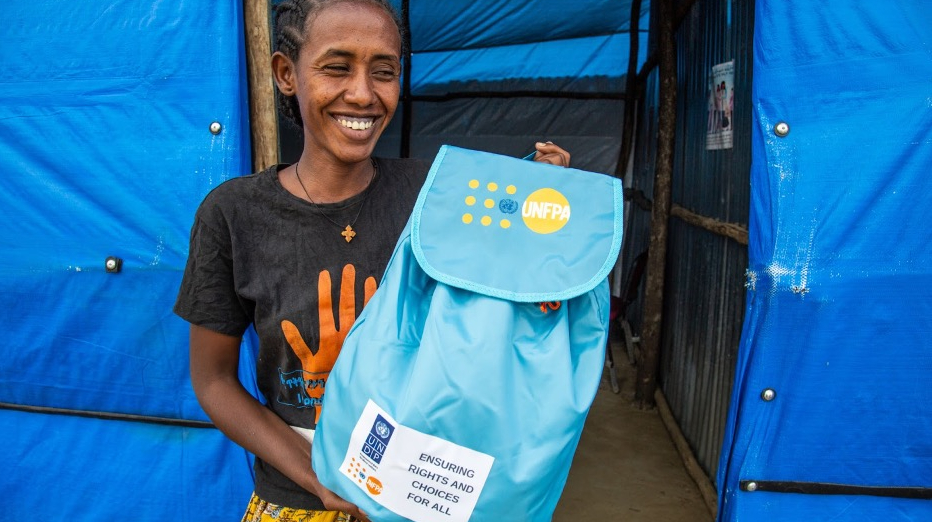Updates
UNFPA and UNDP join forces to support dignity for women and girls in northern Ethiopia
18 Aug 2022
Updates
18 Aug 2022
MEKELLE, Tigray - UNFPA, the United Nations sexual and reproductive health agency, and UNDP, the United Nations Development Programme, are working together to support women and girls in conflict-ravaged northern Ethiopia to maintain their health and hygiene and improve their psychosocial and physical well-being.
The two agencies are working as ‘One UN’, combining their unique strengths to respond to evolving challenges quickly and in coordination. “Creating shared opportunities and leveraging our respective assets to bring value to communities is what the UN system is about,” said Dr. Cleophas Torori, UNDP Deputy Resident Representative.
The partnership is helping vulnerable populations to access critical supplies: Together the agencies have already distributed more than 17,500 dignity kits, which contain essential hygiene items, including sanitary pads, to help displaced women and girls cope better amid the crisis.
The conflict in northern Ethiopia is taking a heavy toll on women and girls, who make up more than half of those currently displaced within northern Ethiopia. Forced to live in overcrowded rooms shared by many families, a shortage of basic hygiene supplies and limited safe water facilities means menstruation can also become fraught with health risks.
“I didn’t know where to put my clothes to dry while hiding them from the other members of the community,” said Mulu Migbel, 17, when asked about how she managed her monthly period at a camp in Amhara. In the Amhara and Afar regions, accessing personal hygiene products has been particularly challenging due to the conflict's expansion and restrictions on people’s freedom of movement, both of which have also impacted the provision of sorely-needed humanitarian assistance.
“I can’t afford to buy pads or soap,” said Tiemti Adugna, 24, a mother of two. “I can hardly provide daily food for my children.” She is currently staying at Sabacare 4, an internally displaced persons’ camp on the outskirts of Mekelle in the Tigray region. Around the world, menstrual hygiene needs are often overlooked in refugee settings. “When you don’t have any income, something as natural as your period becomes a hassle. Every income I get goes to feed my family,” Tiemti added.
Having fled her home with only the clothes on her back, Tiemti was grateful for the dignity kit she received from UNFPA and UNDP. “It helped to restore my mobility and dignity, and prevented my baby from getting scabies,” she said.

The dignity kits contain more than basic hygiene necessities – they include basic clothing items and a whistle and torch to help protect women and girls from sexual assault or abuse. While distributing the kits, UNFPA and UNDP teams also have an opportunity to meet displaced women and assess their physical and psychosocial well-being, as well as to inform them about available reproductive health and gender-based violence protection services. “Dignity kit distributions go hand-in-hand with awareness-raising sessions on the various types of violence against women and where to get help,” explained Ms. Fathema Sultana, a gender-based violence specialist working with UNFPA in Tigray. The sessions and available support are provided at UNFPA-supported women and girls’ safe spaces in the camps, and facilitated by trained community outreach personnel.
“Thanks to the dignity kits, I can live freely and healthily. I can protect myself and my children from health problems”, said Tiemti.